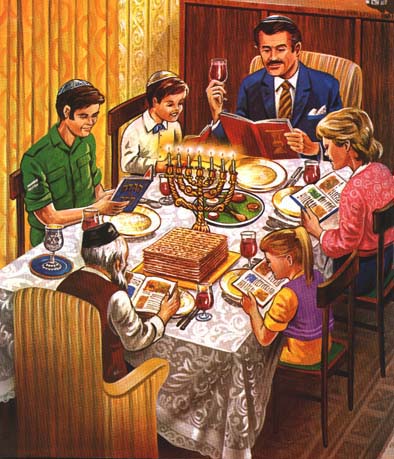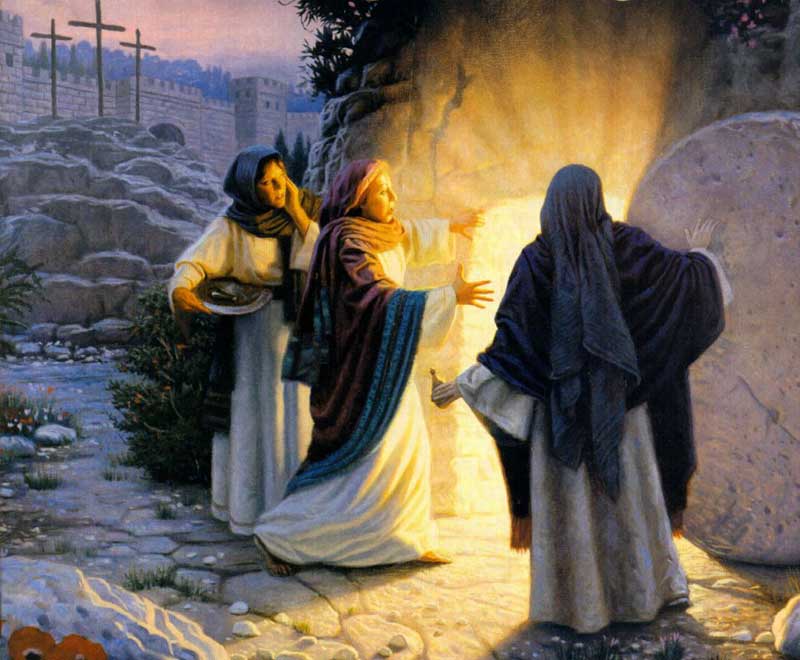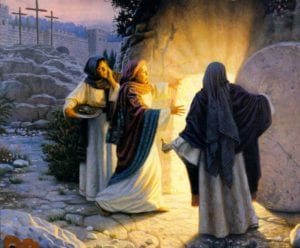 The Bible tells us that Jesus was crucified at Passover (Matthew 26:18-19). This being the case, both Jews and Christians should have the same day in common.
The Bible tells us that Jesus was crucified at Passover (Matthew 26:18-19). This being the case, both Jews and Christians should have the same day in common.
The Jewish community celebrate Passover[1] on the 14th day of their month of Nisan (Leviticus 23:5) which is March/April regardless of the day of the week it falls (see explanatory Note 1 below).
On what day to celebrate Easter was a hotly debated topic in the early church. Polycrates (125-196) the Bishop of Ephesus led the Asian churches in retaining Nisan 14. However, this was replaced by the Sunday following the Paschal moon by the other churches.[2]
 The major change came under the Roman Emperor Constantine (see Note 2 below) when he called for an official Council of Bishops of the area in AD 325 known as the Council of Nicea.[3] As a consequence, it was resolved that Christians would celebrate Easter on the first Sunday (Resurrection Day) following the first full moon following the vernal equinox.[4]
The major change came under the Roman Emperor Constantine (see Note 2 below) when he called for an official Council of Bishops of the area in AD 325 known as the Council of Nicea.[3] As a consequence, it was resolved that Christians would celebrate Easter on the first Sunday (Resurrection Day) following the first full moon following the vernal equinox.[4]
The reason for the change can be gleaned from the letter Constantine sent to those bishops who were not able to attend:
When the question relative to the sacred festival of Easter arose, it was universally thought that it would be convenient that all should keep the feast on one day; for what could be more beautiful and more desirable, than to see this festival, through which we receive the hope of immortality, celebrated by all with one accord, and in the same manner? It was declared to be particularly unworthy for this, the holiest of all festivals, to follow the custom [the calculation] of the Jews, who had soiled their hands with the most fearful of crimes, and whose minds were blinded. In rejecting their custom, we may transmit to our descendants the legitimate mode of celebrating Easter, which we have observed from the time of the Saviour’s Passion to the present day [according to the day of the week]. We ought not, therefore, to have anything in common with the Jews….[5]
The letter continues, but enough has been reproduced to show that the reason for the change of date for the celebration of Easter was basically anti-Semitic. According to Eusebius (260-331), the first person to write a history of Christianity and who was sitting at Constantine’s right hand, there was strong and widespread hatred towards the Jews amongst the Christian community as they were blamed for killing Jesus.[6] This is in total ignorance of the fact that Jesus, God the Son, came to the earth to die for the sins of the world (John 3:16). Although, at Christ’s trial, they cried out to Pilate to Crucify him and said Let his blood be on us and on our children.[7]
![]() There is a further difference within the Christian church, both the Western church and the Orthodox church use the Nicea Declaration for calculating when Easter falls; “The first Sunday after the first full moon on or after the vernal equinox.” That much is straightforward, but the Western church uses the Gregorian calendar while the Orthodox church use the older Julian calendar. Further, calculating these dates involves a bewildering array of ecclesiastical moons and paschal full moons, the astronomical equinox, and the fixed equinox.[8] As a result, Easter sometimes falls on the same day for both, but mostly it does not.
There is a further difference within the Christian church, both the Western church and the Orthodox church use the Nicea Declaration for calculating when Easter falls; “The first Sunday after the first full moon on or after the vernal equinox.” That much is straightforward, but the Western church uses the Gregorian calendar while the Orthodox church use the older Julian calendar. Further, calculating these dates involves a bewildering array of ecclesiastical moons and paschal full moons, the astronomical equinox, and the fixed equinox.[8] As a result, Easter sometimes falls on the same day for both, but mostly it does not.
Our Jewish friends do not accept that Jesus (Yeshua) is the promised Messiah and they are still waiting for Him to come, so of course they keep the Old Testament Passover. However, Christians do not keep Saturday as the as their day of rest (Sabbath), but the first day of the week, Sunday,[9] because it was on the Sunday following Passover that Jesus rose from the dead. Easter must be on a Sunday as well.
Comment
It is a pity to have broken the association of the Christian Easter with the Jewish Passover as the two are inextricable linked, because Christ became our Passover Lamb as John the Baptist proclaimed when he first saw Jesus, Look the Lamb of God who takes away the sin of the world (John 1:29).
Note 1
The Hebrew calendar is based on the rotation of the moon around the earth, with each month starting with the new moon, whereas our calendar is based on the earth’s rotation around the sun with each year being one complete rotation; 356.26 days and the months are fitted into this cycle. God told the Hebrews living under slavery in Egypt to take an unblemished lamb into each house and slaughter it on the fourteenth day of the first month. This is Nisan 14 which is halfway through the month and as a consequence, there must always be a full moon. The Passover is called “pesech” in Hebrew, and in the Greek of the New Testament, this word is rendered as “Pasch.” For this reason, the full moon of Passover is called “The Paschal Moon.”
Note 2
 Up until the time of Constantine, Christians were persecuted, but this changed with the Edict of Milan, a proclamation that permanently established religious toleration for Christianity within the Roman Empire. It was the outcome of a political agreement concluded between the Roman emperors Constantine (274-337) and Licinius in February 313.[10] The reason why Constantine was instrumental in this change is told by Lactantius and recorded by the first Christian historian, Eusebius (260-339)[11]. “On 27 October 312, the night before the critical battle of Milvian Bridge, Constantine had a dream, which he saw the first two letters; the chi and the rho of Christ’s name in Greek superimposed and heard the words, in hoc signo vinces; by which you will conquer. The next morning, he ordered his men to paint this symbol, as shown, on their shields and his helmet.” They then marched into war, accordingly, as “Christian soldiers.” to victory.[12]
Up until the time of Constantine, Christians were persecuted, but this changed with the Edict of Milan, a proclamation that permanently established religious toleration for Christianity within the Roman Empire. It was the outcome of a political agreement concluded between the Roman emperors Constantine (274-337) and Licinius in February 313.[10] The reason why Constantine was instrumental in this change is told by Lactantius and recorded by the first Christian historian, Eusebius (260-339)[11]. “On 27 October 312, the night before the critical battle of Milvian Bridge, Constantine had a dream, which he saw the first two letters; the chi and the rho of Christ’s name in Greek superimposed and heard the words, in hoc signo vinces; by which you will conquer. The next morning, he ordered his men to paint this symbol, as shown, on their shields and his helmet.” They then marched into war, accordingly, as “Christian soldiers.” to victory.[12]
[1] Passover is a single day, followed by seven days of Unleavened Bread. Most Jewish people today, refer to the entire eight days as Passover.
[2] Eusebius The Church History, by Paul L Maier, Kregel Publications,1999, page 197.
[3] Bruce Scott, Israel My Glory, March/April, 2017, page 17.
[4] As Earth revolves around the Sun, there are two moments each year when the Sun is exactly above the equator. These moments, called equinoxes, occur around March 20 or 21 and September 22 or 23. Equinox literally means “equal night,” since the length of day and night is nearly equal in all parts of the world during the equinoxes. The Northern Hemisphere spring equinox is called Vernal and the autumn is called Autumnal.
[5] Phillip Schaff, Nicene and post-Nicene Fathers, Series 11, volume 14, The Seven Ecumenical Councils, “On the Keeping of Easter,” Christian Classics Ethereal Library. http://www.tertullian.org/fathers2/NPNF2-14/Npnf2-14-28.htm.
[6] Eusebius The Church History, by Paul L Maier, Kregel Publications,1999, page 11.
[7] Matthew 27:23-25.
[8] For further reading, go to: http://www.infoplease.com/spot/easter1.html.
[9] The change came early in the Christian era, see Acts 20:7, Corinthians 2:16 and Revelation 1:10.
[10] https://www.britannica.com/topic/Edict-of-Milan.
[11] Eusebius The Church History, by Paul L Maier, Kregel Publication, 1999, page 340.
[12]https://www.britannica.com/topic/Battle-of-Milvian-Bridge.
